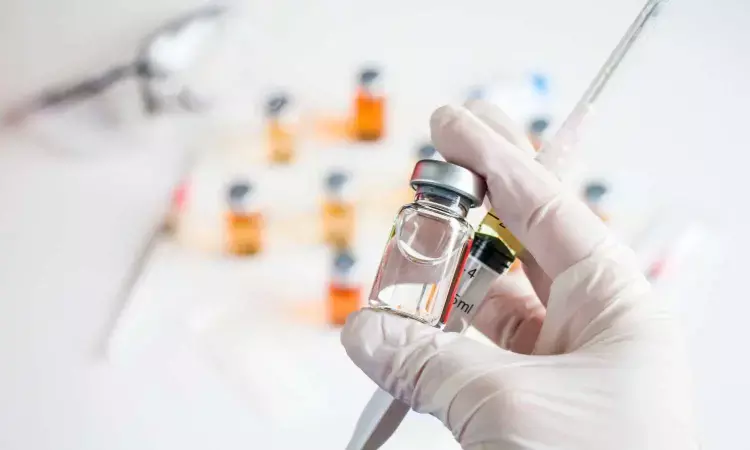- Home
- Medical news & Guidelines
- Anesthesiology
- Cardiology and CTVS
- Critical Care
- Dentistry
- Dermatology
- Diabetes and Endocrinology
- ENT
- Gastroenterology
- Medicine
- Nephrology
- Neurology
- Obstretics-Gynaecology
- Oncology
- Ophthalmology
- Orthopaedics
- Pediatrics-Neonatology
- Psychiatry
- Pulmonology
- Radiology
- Surgery
- Urology
- Laboratory Medicine
- Diet
- Nursing
- Paramedical
- Physiotherapy
- Health news
- Fact Check
- Bone Health Fact Check
- Brain Health Fact Check
- Cancer Related Fact Check
- Child Care Fact Check
- Dental and oral health fact check
- Diabetes and metabolic health fact check
- Diet and Nutrition Fact Check
- Eye and ENT Care Fact Check
- Fitness fact check
- Gut health fact check
- Heart health fact check
- Kidney health fact check
- Medical education fact check
- Men's health fact check
- Respiratory fact check
- Skin and hair care fact check
- Vaccine and Immunization fact check
- Women's health fact check
- AYUSH
- State News
- Andaman and Nicobar Islands
- Andhra Pradesh
- Arunachal Pradesh
- Assam
- Bihar
- Chandigarh
- Chattisgarh
- Dadra and Nagar Haveli
- Daman and Diu
- Delhi
- Goa
- Gujarat
- Haryana
- Himachal Pradesh
- Jammu & Kashmir
- Jharkhand
- Karnataka
- Kerala
- Ladakh
- Lakshadweep
- Madhya Pradesh
- Maharashtra
- Manipur
- Meghalaya
- Mizoram
- Nagaland
- Odisha
- Puducherry
- Punjab
- Rajasthan
- Sikkim
- Tamil Nadu
- Telangana
- Tripura
- Uttar Pradesh
- Uttrakhand
- West Bengal
- Medical Education
- Industry
Mpox vaccine effective in decreasing severity of monkeypox infection: The Lancet Infectious Diseases study

USA: A recent international study published in The Lancet Infectious Diseases showed less severe mpox (formerly known as monkeypox) infections in those vaccinated or who had a previous infection in 2022. The research that looked at 38 mpox infections in 37 gay and bisexual men underlined the importance and effectiveness of vaccination.
Eight of the 38 were reinfections, and 30 infections occurred after a complete vaccination course. In the people who had been vaccinated, the results showed that the patients had fewer lesions (abnormal tissue such as a wound or rash), less mucosal disease (diseases of the mucous membranes of the mouth and genitals), and a minimal need for pain medication or hospitalisation.
The severity of symptoms was observed and assessed using the Mpox-SSS score, which was developed during the 2022 multi-country outbreak. The Mpox-SSS score is a numerical score given considering seven different factors including the number of lesions, the level of care required for the patient, the amount of pain medication needed, the extent of mucosal areas affected, and whether there is any bacterial superinfection – i.e., additional infections.
Using this scoring system it was possible to demonstrate and measure severity. In those who had been reinfected, the disease was less severe with a lesser requirement for pain medication compared to their first bout, and fewer areas of the body were affected while recovery was also faster. The first infection lasted 21 days (median) whereas the second infection lasted 15 days (median).
The study is the largest and only case series to examine both reinfections and infections after a complete vaccine course of Modified Vaccinia Ankara-Bavarian Nordic (MVA-BN).
Since May 2022, there have been more than 87,000 cases of human mpox across 112 countries. Transmissions have primarily affected sexually active gay and bisexual men and have been caused by skin-to-skin and bodily fluid contact. As evidenced by the two previous SHARE-net global case series published in The NEJM and The Lancet, infection often causes rashes, fevers, and blisters. It can also lead to brain inflammation and seizures. In people with advanced HIV disease, it carries a mortality of up to 27% in the most immunosuppressed group.
Neither natural immunity from a prior mpox infection nor post-vaccination immunity can prevent someone from getting the virus. However, the study shows that immunity from both reduces severity.
Research lead author Chloe Orkin, Professor of HIV Medicine at Queen Mary University of London and Director of the SHARE collaborative said: “This is good news and shows that post-vaccination infections are less severe and the need for hospitalisation is lower. This is clear evidence that vaccination is an important tool in reducing morbidity and controlling further outbreaks.
“We have to ensure global access to vaccinations and treatments if we want to curb this global outbreak, especially in the African regions that have been historically worst affected and are still without access to vaccines or treatment for mpox.”
Reference:
Aniruddha Hazra, Jason Zucker, Elizabeth Bell, John Flores, Leanna Gordon, Oriol Mitjà, Clara Suñer, Adrien Lemaignen, Simon Jamard, Silvia Nozza, Achyuta V Nori, Edgar Pérez-Barragán, Mpox in people with past infection or a complete vaccination course: a global case series, DOI:https://doi.org/10.1016/S1473-3099(23)00492-9.
Dr Kamal Kant Kohli-MBBS, DTCD- a chest specialist with more than 30 years of practice and a flair for writing clinical articles, Dr Kamal Kant Kohli joined Medical Dialogues as a Chief Editor of Medical News. Besides writing articles, as an editor, he proofreads and verifies all the medical content published on Medical Dialogues including those coming from journals, studies,medical conferences,guidelines etc. Email: drkohli@medicaldialogues.in. Contact no. 011-43720751


